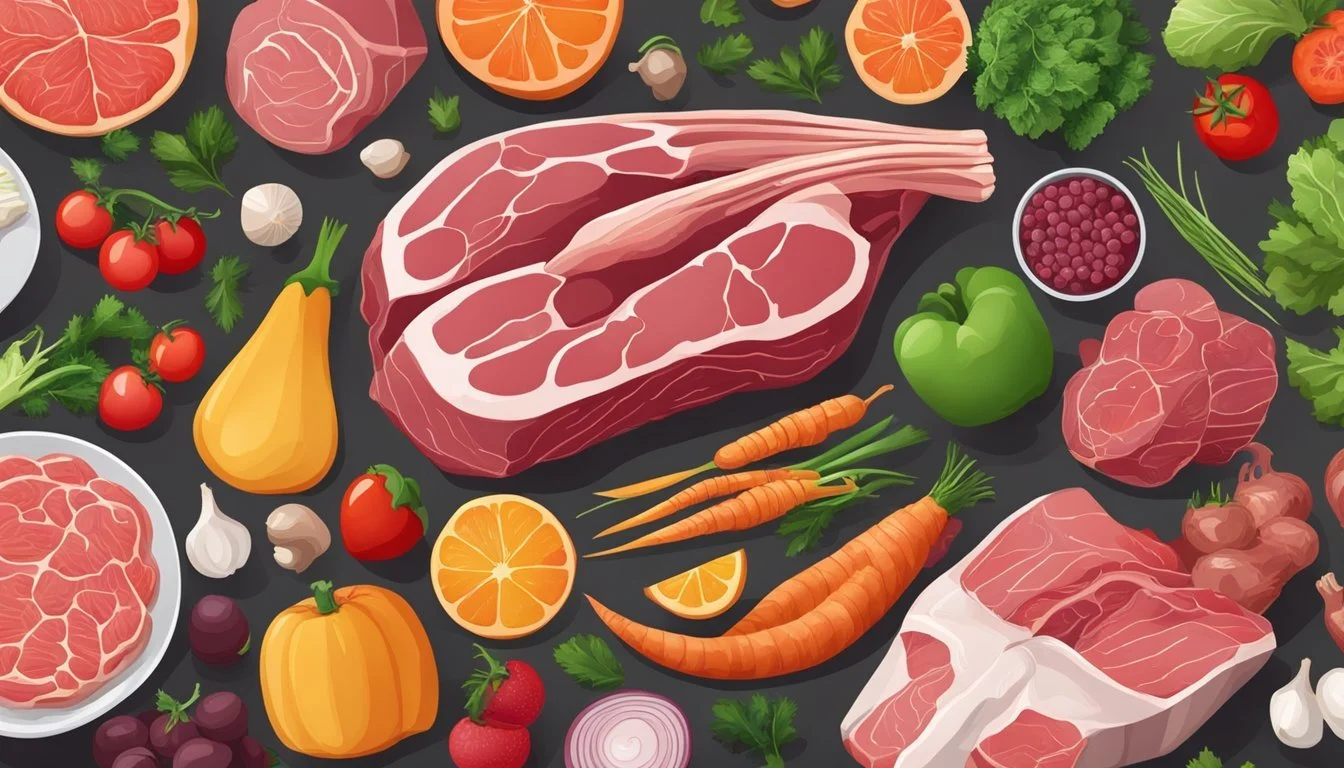Unlocking the Power of Bioavailable Copper in a Carnivore Diet
Essential Benefits Explored
Copper is a vital mineral crucial for various biological functions, and its bioavailability determines how well the body can absorb and utilize it. A carnivore diet, which primarily includes animal-based foods, offers a unique opportunity to maximize copper intake efficiently. Animal-based proteins are highly bioavailable and can be more readily absorbed than plant-based sources, making them a superior choice for meeting the body's copper needs.
In homes, copper is commonly found in water supply systems and wiring, but its presence extends beyond infrastructure to our nutrition. Animal foods rich in copper, such as liver and shellfish, are key elements of a carnivore diet, ensuring adequate intake of this essential nutrient. By focusing on bioavailable sources of copper, individuals on a carnivore diet can support various health benefits, from energy production to maintaining healthy connective tissues.
While the carnivore diet has its proponents and critics, its ability to provide bioavailable copper without the interference of anti-nutrients found in some plant foods is a noteworthy advantage. This approach not only helps in meeting daily copper requirements but also supports overall health in a manner aligned with human evolutionary nutrition. The carnivore diet thus stands out as a potential powerhouse for unlocking the health benefits of bioavailable copper.
Carnivore Diet Fundamentals
The Carnivore Diet is centered on the exclusive consumption of animal products. It has a historical context and offers a distinct nutritional profile rich in macronutrients and micronutrients.
Defining the Carnivore Diet
The Carnivore Diet involves consuming only animal-based foods, such as meat, fish, eggs, and some dairy. This diet completely excludes fruits, vegetables, grains, and nuts. Proponents argue that animal foods contain all the necessary nutrients for human health. The focus is primarily on meat and animal fats, which are rich in protein and essential fats.
Historical Significance
Historically, human diets have often included a significant proportion of animal products. Many traditional societies consumed diets centered on hunting and animal husbandry. These diets provided high levels of protein and fat, crucial for survival in harsh environments.
In modern times, the Carnivore Diet draws on this legacy, claiming to emulate the dietary patterns of early humans. The argument is that such diets are more aligned with human evolutionary adaptations.
Nutritional Profile
The Carnivore Diet emphasizes consumption of nutrient-dense animal products. Proteins, fats, and a variety of micronutrients from organ meats are central to this diet.
Proteins play a crucial role in muscle repair and growth.
Fats provide energy and aid in nutrient absorption.
Organ meats like liver are rich in vitamins such as A, B12, and minerals like iron and copper.
These components form a balanced profile capable of supporting human metabolism and health without reliance on plant-based foods.
Nutrient Bioavailability in Animal Foods
Animal foods often provide superior nutrient bioavailability. This includes bioavailable sources of copper, along with other essential vitamins and minerals necessary for optimal health.
The Importance of Nutrient Bioavailability
Nutrient bioavailability is crucial as it determines how well the body can absorb vitamins and minerals from ingested foods. In animal foods, many nutrients such as copper, vitamin B12, and essential amino acids are present in forms that the body can efficiently utilize.
For instance, copper from animal sources is highly bioavailable, crucial for functions like iron metabolism and enzyme activity. Vitamin B12 and riboflavin found in meat and organs contribute to red blood cell formation and energy metabolism.
Advantages of Animal-Sourced Nutrients
Animal-sourced nutrients offer distinct benefits in terms of absorption and utilization by the human body. Amino acids from animal proteins are considered complete, containing all essential amino acids necessary for muscle repair and growth. Fatty acids like omega-3s found in fish are also easier to absorb.
Vitamins and minerals, including iron, zinc, and copper, found in meat, fish, and organ meats like liver, are not only in higher concentrations but are also in more bioavailable forms compared to plant sources. This enhanced bioavailability supports overall metabolic functions.
Bioavailable Copper Sources
Copper is a vital mineral found abundantly in animal foods. Liver, especially beef liver, is one of the richest sources of bioavailable copper. Shellfish, such as oysters and crab, also provide significant copper content.
This mineral plays a role in the formation of hemoglobin, maintenance of connective tissues, and enzymatic reactions vital for maintaining immune health and energy production. The bioavailability of copper in these animal sources ensures that the body can efficiently utilize this essential mineral.
Animal foods thus provide a comprehensive package of bioavailable nutrients that support various bodily functions, contributing significantly to nutritional requirements in a carnivore diet.
Health Implications
Bioavailable copper plays a vital role in numerous bodily functions and can influence aspects like cardiovascular health, mental well-being, and weight management, especially within a carnivore diet.
Health Benefits and Risks
Bioavailable copper is crucial for maintaining various physiological processes. It aids in the formation of red blood cells, supports the immune system, and promotes proper brain function. Copper also acts as an antioxidant, protecting cells from damage caused by free radicals.
Risks arise from excessive copper intake, which can lead to toxicity. Symptoms of copper toxicity include gastrointestinal distress, liver damage, and neurological problems. Maintaining the right balance is essential, as both copper deficiency and toxicity can negatively impact health.
Impact on Cardiovascular Health
Copper is integral to heart health. It helps maintain healthy blood vessels, ensuring proper blood flow and reducing the risk of heart disease. Copper supports the formation of connective tissues in the cardiovascular system and aids in iron metabolism, which is vital for preventing anemia.
Insufficient copper levels might contribute to increased cholesterol levels and high blood pressure - both risk factors for heart disease. Conversely, excessive amounts can result in oxidative stress, potentially harming the heart and blood vessels.
Digestion and Mental Health Connections
Copper is involved in enzyme production that aids digestion, enhancing nutrient absorption from food. This can improve overall well-being and energy levels, which are pivotal for maintaining a healthy lifestyle.
For mental health, copper influences neurotransmitter synthesis, impacting mood regulation and cognitive functions. Proper copper levels can support mental clarity and emotional stability, whereas an imbalance might be linked to disorders such as depression and anxiety. Monitoring copper intake is crucial for maintaining a balanced mental state.
Weight Management and Obesity
Copper can affect weight management through its role in energy metabolism. It helps convert food into energy, which can be beneficial for those looking to manage their weight within a carnivore diet. Additionally, adequate copper levels might enhance the body's ability to burn fat more efficiently.
A deficiency in copper could slow down metabolism, potentially leading to weight gain and obesity. It's essential to balance copper intake carefully to support metabolic health and avoid potential weight-related issues.
Implementing a Carnivore Diet
Achieving success with a carnivore diet hinges on careful planning, incorporating bioavailable nutrients, and considering long-term health impacts. Here’s a structured approach to ensure a nutritionally complete and sustainable diet.
Creating a Balanced Meal Plan
Constructing a balanced meal plan on the carnivore diet involves selecting a variety of animal-based foods to ensure a comprehensive intake of proteins and fats. Key components include beef, eggs, fish, and dairy.
Beef: Provides essential amino acids and minerals
Eggs: Rich in key vitamins, and healthy fats
Fish: Important source of omega-3 fatty acids
Dairy: Offers calcium and vitamin D
Combine these elements throughout the week to avoid monotony and ensure nutritional balance. A sample weekly meal plan might include ribeye steaks, liver (for its rich vitamin and mineral content), and full-fat cheese.
Incorporating Bioavailable Nutrients
In the context of the carnivore diet, bioavailable nutrients such as heme iron, vitamin B12, and bioavailable copper play crucial roles. Organ meats are particularly significant:
Liver: A nutritional powerhouse with copper, iron, and vitamins A and B12
Kidneys and heart: Contain coenzyme Q10 and other essential nutrients
To optimize nutrient intake, include these organ meats regularly. For instance, consuming liver once or twice a week can provide substantial quantities of bioavailable copper and iron.
Considerations for Longevity
Sustainable practices are essential for maintaining the benefits of the carnivore diet over the long run. Focusing on nutrient-dense foods can support overall health and longevity:
Ensuring varied protein intake: Incorporate different sources like beef, pork, and fish
Monitoring health markers: Regular blood tests to track vitamin and mineral levels, kidney, and liver function
Including high-quality fats: Both saturated and unsaturated fats from animal sources can support hormone production and cellular health
Balancing red meats with seafood and organ meats while avoiding processed meats can help mitigate potential negative impacts. This balanced approach supports not just day-to-day health but also long-term vitality.
Potential Deficiencies and Supplementation
A carnivore diet, while rich in certain nutrients, may lack others commonly found in plant-based foods. Addressing these deficiencies through dietary choices and supplements is crucial for maintaining health on this diet.
Addressing Potential Nutrient Deficiencies
Vitamin D and Calcium: These nutrients are essential for bone health. While fatty fish and liver can provide some vitamin D, supplementation might be necessary due to limited sources. Calcium, often obtained from dairy or fortified foods, can be supplemented with quality calcium supplements.
Vitamin C and Magnesium: Fresh meat contains minimal vitamin C, vital for immune function and skin health. Magnesium, found in leafy greens and nuts, is also low in a strict carnivore diet. To avoid deficiencies, consider supplements or include organ meats like beef liver, which contain some magnesium.
Supplementation Strategies
Omega-3 Fatty Acids: Fatty acids like omega-3s are crucial for heart and brain health. Fatty fish like salmon and sardines are excellent sources. Alternatively, fish oil supplements can be used to ensure adequate intake.
Fiber: Although fiber is typically absent in a carnivore diet, its importance for digestive health cannot be understated. While not strictly necessary for everyone, some might benefit from small amounts of fiber supplements or fermented foods to aid digestion.
Comprehensive Multivitamins: A well-rounded multivitamin can address multiple deficiencies at once. Look for those containing vitamin C, vitamin D, magnesium, and other essential nutrients.
A balanced approach, combining food sources and supplements, can help mitigate nutrient deficiencies effectively.
Online stores offer unbeatable prices for omega-3, fiber, calcium, vitamin C, vitamin D, and magnesium, so don't miss out!
Comparative Analysis
In comparing the carnivore diet to various dietary approaches, it's crucial to explore how each regimen impacts bioavailable copper. Differences in food sources can lead to variations in nutrient absorption and overall health.
Carnivore vs. Keto Diets
The carnivore diet is primarily composed of animal-based foods, while the keto diet includes a mix of fats, proteins, and minimal carbohydrates. While both promote protein intake, the keto diet allows for consumption of low-carb vegetables and limited fruits.
Copper bioavailability is higher in the carnivore diet due to its reliance on organ meats and shellfish. These foods are rich in copper, which is crucial for metabolic and physiological processes. In contrast, the keto diet often incorporates plant-based foods that contain copper but in less bioavailable forms.
Moreover, the keto diet's inclusion of fibrous vegetables can influence copper absorption. Fiber can bind to minerals, reducing bioavailability. The carnivore diet lacks fiber, ensuring more efficient copper uptake but potentially neglecting other health benefits associated with fiber.
Carnivore Diet vs. Plant-Based Diets
The carnivore diet contrasts sharply with plant-based diets that emphasize vegetables, fruits, grains, and legumes. Bioavailable copper in the carnivore diet is usually higher due to concentrated sources in animal-based foods.
Plant-based foods offer copper too, but often in less bioavailable forms. Factors like phytates in grains and legumes can inhibit copper absorption. In contrast, the absence of these inhibitors in a carnivore diet means higher efficiency in copper uptake.
Furthermore, plant-based diets provide significant amounts of fiber, which can affect mineral absorption adversely. The carnivore diet’s lack of fiber ensures minimal interference with copper absorption, allowing for potentially better bioavailability compared to plant sources.
Sociocultural Considerations
Adopting a carnivore diet, particularly one emphasizing bioavailable copper, can affect social interactions and raise ethical and environmental questions. Awareness of these factors can lead to more informed decisions.
Navigating Social Settings
People following a carnivore diet may face challenges in social settings where plant-based foods are common. Family gatherings, dining out, and workplace events might lack suitable options. Preparing in advance by communicating dietary needs can ease these situations.
Variety in preparation methods and cuts of meat can help maintain flexibility. Simple swaps, such as opting for grilled meats or requesting dishes without sauces, can make dining out more manageable. Explaining dietary choices clearly to friends and family can foster understanding and support.
Ethical and Environmental Impacts
Ethical considerations often accompany diet choices rooted in animal products. Concerns about animal welfare and ethical farming practices are significant. Prioritizing meat from local farmers, free-range, or grass-fed sources can address some ethical worries.
Environmental impact also plays a role. Meat production has implications for land use, water consumption, and greenhouse gas emissions. However, regenerative farming practices and choosing less resource-intensive meats can mitigate some negative effects. Awareness of these factors can lead to more sustainable choices within a carnivore diet.
By thoughtfully addressing these aspects, followers of a carnivore diet can navigate sociocultural dimensions more effectively.
Conclusion
Bioavailable copper plays a significant role in enhancing overall health.
A diet centered on animal products, such as the Carnivore Diet, provides a rich source of this essential trace mineral.
Copper is vital for various physiological processes including iron metabolism, neurotransmitter synthesis, and immune function.
Research indicates the bioavailability of copper in human breast milk is around 24%, while cow's milk offers approximately 18%.
The Carnivore Diet, emphasizing meat and animal products, can potentially enhance copper absorption compared to plant-based diets.
Copper's nutrient density in animal sources aligns with the diet's focus on delivering essential nutrients efficiently.
Health benefits associated with adequate copper intake include improved energy production, maintenance of connective tissue, and support of cardiovascular health.
Those following a Carnivore Diet may find it easy to meet their copper requirements through regular consumption of copper-rich foods like liver, oysters, and other organ meats.
Focusing on bioavailable copper within such a diet can contribute to optimized overall health.
Maintaining sufficient copper levels can lead to fewer deficiencies and enhanced bodily functions, supporting long-term well-being.














